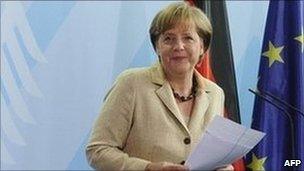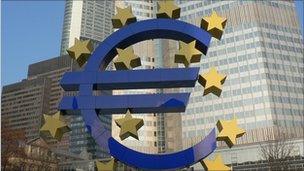All eyes on Merkel
- Published
- comments

Angela Merkel is in discussions with G7 finance ministers and ECB board members
The future of Europe's economy, and in the longer term, of its political cohesion, seems to hinge on one person: Angela Merkel.
It's is hardly the fault of the German chancellor that others are in the cross-hairs of the bond market, but she is the one person who could disarm that market firepower.
It matters a bit what Silvio Berlusconi has to say about Italy's fiscal reforms, as there's work to be done in reassuring the markets that the Italian premier is serious. And of course, he's done so much to ensure that hardly anyone outside Italy treats him seriously.
But along the Mediterranean and up the Atlantic coast to Ireland, there is only so much political leaders can promise in reducing their deficits and debts unless the Germans are willing to provide a guarantee that they'll keep the euro and the eurozone together.
It's not just about the Germans. The Dutch and the Finns know that they would be required to commit a similar proportion of financial and political capital, but only the Germans have the scale and status to take the lead.
Smug Britain
It probably doesn't help at all to find that the UK's Chancellor of the Exchequer, George Osborne, is reportedly arguing (from his US holiday) for the eurozone to start issuing euro bonds. That would effectively force a collective guarantee of European Central Bank (ECB) debt by all eurozone members, implying a much tighter common fiscal policy.
It won't be lost on the Germans that such a prospect is precisely what's kept Britain out of the eurozone, and looking a tad smug, so it's a bit rich to be offering that advice now.
How much would have to be guaranteed? It looks like a blank cheque is required. The 440bn euros so far made available is nowhere close to the sums that might be required if yields on Spanish and Italian government bonds continue to rise, leading to a requirement they get access to a special borrowing facility.
The markets are not looking for a specific sum, but they are looking for impact to indicate seriousness of purpose, and that means something comfortably north of one trillion euros - that's 1,000bn euros.
The longer this crisis shows a failure of political leadership, the bigger that impact will have to be.
While Rome burns
So the options include a willingness of the ECB to start buying Italian and Spanish bonds, without waiting for a formal bailout package.
The 21 July agreement between eurozone leaders allowed the bank to do just that, but it showed no signs amid last week's market turmoil that it's up for doing so.
It only bought Portuguese and Irish bonds, as already mandated, appearing to make matters worse by emphasising its consistent habit of being behind the curve.
That 21 July agreement bought very little time for European leaders. It's not surprising that, once they had seen off the imminent threat of a US default, the markets turned their attention back to European sovereign debt, particularly when you consider the contradictions within the deal.
By seeking to put a firewall round Greece, saying only Athens would get special treatment with a managed default, it implied, of course, that others would not be so fortunate. So what kind of reassurance is that?
The markets either think the firewall round Greece is not credible, and a disorderly default will follow, or it's all too credible, and other countries will be left hanging out to dry.
Either way, the markets seem to be seeking much better clarification of whether stronger eurozone countries will back weaker ones.

An agreement allowing the European Central Bank to buy bonds was reached in July
Cost of collapse
And that's where the pressure is on Angela Merkel. Can she guarantee the debt, and face the potential of a political backlash in Germany?
Indeed, is the risk of backlash and a replacement of her government such that her guarantee would command little respect from the markets?
Is Germany willing to see the euro and eurozone disintegrate? Has it calculated the difficulties and costs that would create for its own exports, or is its success in exporting to Asia moving its focus to more global markets?
And how about the risk that a reconstituted Deutschmark - or more likely a narrower, stronger northern eurozone - would mean a stronger currency, making Germany's exports much less competitive?
Those are big decisions for Angela Merkel and the German government. Her input to discussions between G7 finance ministers and between board members of the ECB are likely to be decisive ahead of nervous markets opening on Monday morning.
Democratic gridlock
Meanwhile, there will be hollow laughter in Athens, Lisbon, Dublin and Madrid at the fury in Washington directed at the credit rating agencies.
On its way to downgrading the US government, it has argued that Standard & Poor miscalculated by a couple of trillion dollars. Easily enough done. We've all lost money down the back of the sofa.
But it's also argued in Congress that the ratings agency has no business poking its nose into the political decisions made in Washington. Who are these mathematical geeks to be making a judgement about democratic gridlock?
Sorry, guys, but that's the markets for you - however unscientific the calculation, and however lousy their track record with sub-prime mortgages.
Even before S&P dropped its bombshell, markets had already decided American bonds were to be shunned in favour of Swiss francs, Japanese yen and gold.
Like any bank manager, they're simply reckoning their chances that loaned money will be repaid.
And if the partners are squabbling furiously at the same time as applying for a very large mortgage, their bank manager might have his doubts.